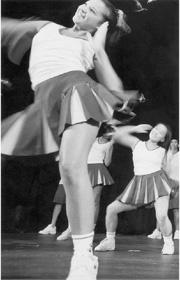PERHAPS EVERYONE SHOULD keep a video diary and revisit it every seven years. As a record of one’s life, film is incomparable in its accuracy—a person’s appearance, attitude, voice, and diction are captured perfectly. A more vivid mirror doesn’t exist, and often, the reflection can be difficult to face.
42 UP
directed by Michael Apted
plays January 14-20 at Varsity
Back in 1964, Michael Apted interviewed a bunch of British schoolchildren for the television documentary 7 Up. All of the children were 7 years old, handpicked from different socioeconomic backgrounds. The film, intended as an indictment of the British class system, aimed to give a “glimpse of the year 2000,” when the children would be the country’s shopkeepers and executives.
Apted, whose diverse directing credits include Nell, Gorillas in the Mist, and The World Is Not Enough, has revisited the same children every seven years to chart their lives. But what began as a political examination succeeds most as a set of personal dramas. Now 42, the “kids” juggle careers, spouses, ex-spouses, and children of their own who are growing into adulthood, and 42 Up serves as a poignant reflection on middle age.
One of the subjects, Neil, became destitute by 28. Living in a trailer, he was emaciated, unwashed, and had dark spots on his forehead. When asked if he thought he was going mad, he said, “Oh, I don’t think it. I know it.” By 35, he seemed to have lost all hope, and predicted that in seven years, he’d be homeless and wandering the streets of London.
By 42 Up, Neil seems to have made a turnaround. He’s politically active as an elected council member. “Apathy causes bad government,” he says, defying his own past apathy about life. Still, you wonder how long his newfound vigor will last. He seems unstable—perhaps because Apted keeps cutting back to past clips—and you feel a kind of parental concern for him.
A more hopeful subject has been Tony, who at 7 wanted to be a jockey. He didn’t make it and became a taxi driver instead. At 28, he was proud of his accomplishments. He said that he liked the “outdoor life” and “independence” of being a cabbie. Yes, he came from a working-class home, but now he could afford to vacation in Spain.
At 42, however, Tony’s pride seems deflated. His marriage has been strained by an affair, and he’s working harder than ever to pay the bills. He drives the cab at night, while his wife works days. Standing in his narrow backyard, Tony reflects that he’s done well for himself, but that he realizes his limits. “I’m just a cabbie. . . . I’ve gone as far as I could.”
Kids say the darndest things, but it seems unfair that 42 Up haunts its subjects with what they said decades ago. At 7, John, who was already reading The Observer and had boarding school and then Oxford mapped out for him, said that paying for education was good, because otherwise his school would be overcrowded. “Yes!” quipped fellow student Charles. “And the poor people would come rushing in!” By 28, both John, who became a barrister, and Charles, a reporter for the BBC, dropped out of the documentary. Nonetheless, 42 Up gets the last word, as it shows the same clips from when they were 7. So it’s no wonder that when asked what the experience of participating in the documentary has been like, one of the adults describes it as swallowing a “pill of poison.”







